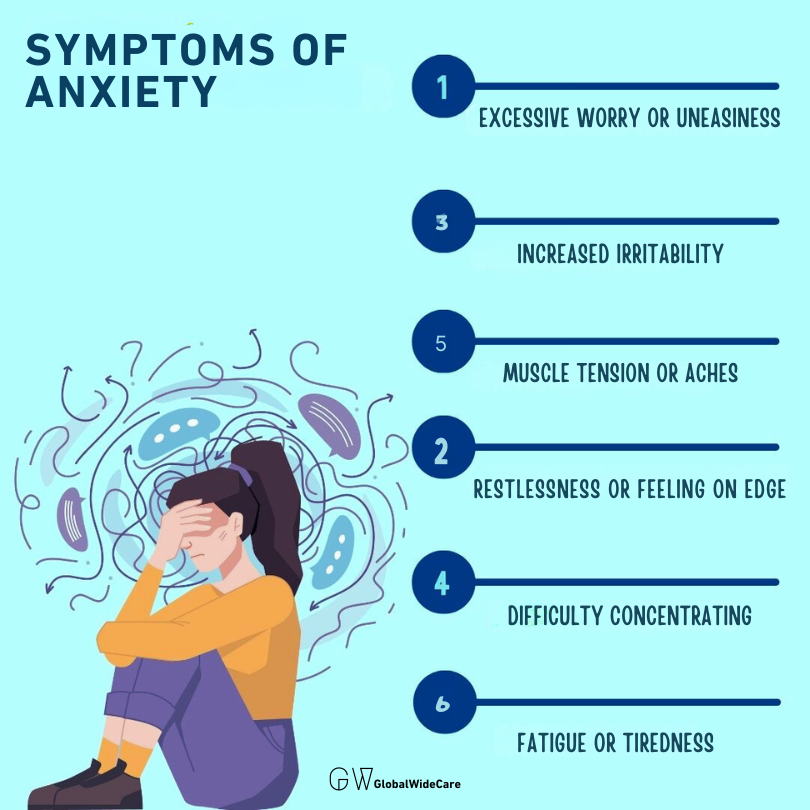Imagine waking up every day with a feeling of dread in the pit of your stomach, unable to pinpoint exactly why. Anxiety can creep into your life unexpectedly, affecting everything from your ability to focus at work to enjoying time with loved ones. It’s a silent struggle many face, but not everyone knows how to conquer it.

Table of Contents
What Exactly Is Anxiety?
Anxiety isn’t just about feeling stressed or worried; it’s a persistent feeling of unease, fear, or dread that doesn’t go away. While it’s a normal response to stressful situations, nervousness can become overwhelming when it lingers for no apparent reason.
- Distress is a mental health condition that can cause both physical and emotional symptoms.
- It’s more than just worry—nervousness can disrupt your daily life, relationships, and overall well-being.
- Nervousness can manifest in various forms, from generalized distress disorder (GAD) to panic attacks, social nervousness, and specific phobias. It can make even simple tasks feel insurmountable, leading to avoidance behaviors that further reinforce the nervousness.


- Over time, untreated nervousness can contribute to chronic stress, impacting your physical health, such as causing headaches, digestive issues, or sleep disturbances.
- Recognizing the signs and seeking support is crucial to managing distress effectively.
The Impact of Anxiety on Your Daily Life
Living with nervousness is like carrying a heavy weight on your shoulders every day. It affects your mood, energy levels, and even your physical health. Symptoms like headaches, muscle tension, and digestive issues are common in those with chronic nervousness.
- Distress can lead to insomnia, making it difficult to get the rest you need.
- It can cause you to avoid situations that trigger your nervousness, leading to isolation.
- Over time, nervousness can even weaken your immune system, making you more susceptible to illnesses.
Recognizing the Signs of Anxiety
Understanding the symptoms of nervousness is the first step in managing it. While everyone experiences nervousness differently, common signs include:
- Persistent worry or fear that’s difficult to control
- Restlessness or feeling on edge
- Fatigue and difficulty concentrating
- Irritability and mood swings
- Physical symptoms like a racing heart, sweating, and shortness of breath
If you notice these symptoms in yourself, it’s important to take them seriously. Nervousness can be managed, but it requires recognizing the problem and taking action.
The Science Behind Anxiety
Anxiety has roots in the brain’s fight-or-flight response, a survival mechanism that prepares us to face danger. When this response is triggered without a real threat, it can lead to feelings of nervousness.
- The amygdala, a part of the brain that processes emotions, plays a key role in nervousness.
- Neurotransmitters like serotonin and dopamine also influence your mood and can affect nervousness levels.
- Genetic factors can make some people more prone to nervousness than others.
Understanding these underlying mechanisms can help demystify anxiety and show that it’s not just “in your head”—it’s a real condition with real effects on your body and mind.
How to Manage Anxiety: Proven Strategies That Work
The good news is that anxiety is manageable. Here are some proven strategies that can help you regain control over your life:
- Practice Mindfulness and Meditation
- Mindfulness techniques, such as deep breathing and meditation, can help calm your mind and reduce distress.
- These practices train your brain to focus on the present moment, breaking the cycle of worry.
- Exercise Regularly
- Physical activity releases endorphins, the body’s natural mood lifters.
- Even a short walk can help reduce distress and improve your overall sense of well-being.
- Establish a Routine
- Routines provide a sense of predictability, which can be calming for those with distress.
- Stick to regular sleep, eating, and exercise schedules to help stabilize your mood.
- Limit Caffeine and Alcohol
- Both caffeine and alcohol can exacerbate distress symptoms.
- Opt for calming beverages like herbal tea instead.




- Seek Professional Help
- Cognitive Behavioral Therapy (CBT) is a highly effective treatment for distress.
- A therapist can help you identify and challenge the thought patterns that contribute to your distress.
- Use Relaxation Techniques
- Techniques such as progressive muscle relaxation can help reduce physical tension.
- This, in turn, can lower anxiety levels and help you feel more in control.
- Consider Medication If Necessary
- In some cases, medication may be necessary to manage distress.
- Speak with your healthcare provider to determine if this is the right option for you.
The Role of Support Systems
Don’t underestimate the power of a strong support system in managing distress. Whether it’s friends, family, or a support group, having people to talk to can make a significant difference.
- Share your feelings with someone you trust. Simply talking about your worries can lighten the burden.
- Consider joining a support group where you can connect with others who understand what you’re going through.
Impact of Diet and Nutrition on Anxiety
Your diet plays a crucial role in managing distress. Certain foods can either help alleviate symptoms or exacerbate them.
- Eat a Balanced Diet: Incorporate fruits, vegetables, lean proteins, and whole grains. These provide essential nutrients that support brain health and overall well-being.
- Stay Hydrated: Dehydration can worsen anxiety symptoms, so drink plenty of water throughout the day.
- Limit Sugar and Processed Foods: High sugar and processed foods can lead to blood sugar fluctuations, which can impact your mood and distress levels.


Incorporate Healthy Habits into Your Lifestyle
In addition to dietary changes, adopting healthy habits can also make a difference in managing distress.
- Get Quality Sleep: Aim for 7-9 hours of sleep per night. Establish a relaxing bedtime routine to improve sleep quality.
- Practice Deep Breathing: Techniques like diaphragmatic breathing can activate your parasympathetic nervous system, which calms your body.
When to Seek Help
If anxiety is interfering with your daily life, it’s time to seek professional help. There’s no shame in reaching out—mental health is just as important as physical health.
- Consult a mental health professional if you’re experiencing severe distress that doesn’t improve with self-care strategies.
- Early intervention can prevent distress from becoming more severe and improve your quality of life.
Conclusion
Anxiety is a formidable challenge, but it’s one that can be managed with the right strategies and support. By understanding what distress is, recognizing its impact, and employing proven techniques to manage it, you can reclaim your life from its grasp. Remember, you don’t have to navigate this journey alone—resources and support systems are available to help you along the way.
Taking proactive steps to address anxiety can lead to profound improvements in your quality of life. From practicing mindfulness to seeking professional help, each action you take brings you closer to a calmer, more balanced state of being. Embrace these strategies, stay committed to your well-being, and know that with perseverance and support, a life free from the constraints of distress is within your reach.
Don’t let anxiety define your life. Start implementing these strategies today, and take the first step towards a brighter, more peaceful future.
External Resources for Further Reading
- Anxiety and Depression Association of America: Provides resources on understanding and managing distress.
- National Institute of Mental Health: Offers information on distress disorders and treatment options.
- Mindfulness-Based Stress Reduction: A guide to mindfulness practices that can help reduce distress.